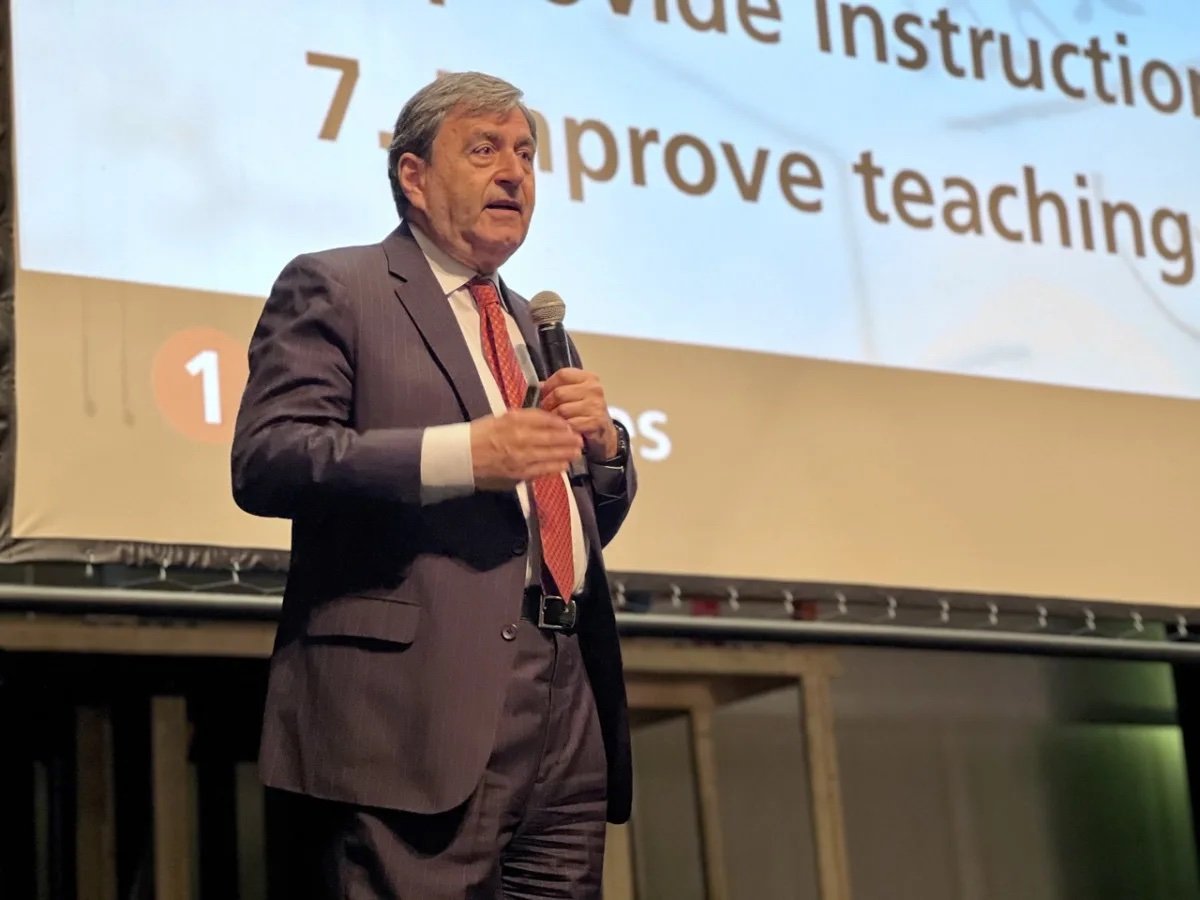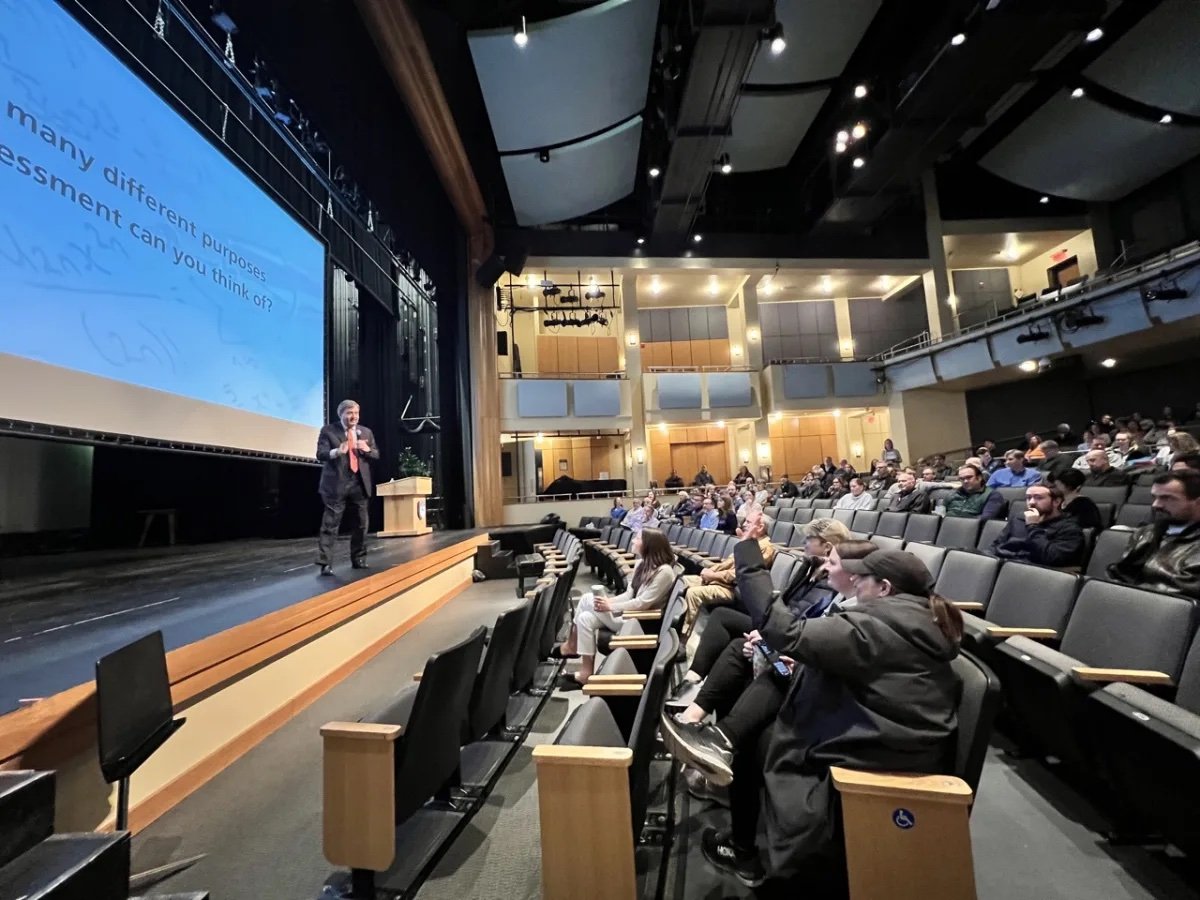Harvard Professor Dr. Eric Mazur Leads EA Professional Development on Assessment Practices
EA faculty and staff had the pleasure of learning and working with Dr. Eric Mazur, Harvard University’s Balkanski Professor of Physics and Academic Dean of Applied Sciences and Engineering and a renowned educational innovator, during a professional development day on Friday, March 24.
“After years of admiring his innovative and impactful pedagogy in the college classroom from afar, the CTL [Center for Teaching and Learning] is excited that Eric is joining us for conversations throughout today and beyond about his work and its applicability to, and impact on, our classrooms here at EA,” said Josh Berberian, coordinator of the Center for Teaching and Learning (CTL) and institutional researcher, in his introduction of Dr. Mazur.
An expert speaker on a range of pedagogical issues, including grading and assessment of learning, moving beyond class lectures, and differentiating education from entertainment in the classroom, Dr. Mazur led a dynamic keynote on assessment tasks and grading. Listen to an episode of EA Unlocked with Dr. Mazur.
“Today I want to focus on the end of our classes and argue that assessment too often focuses on the regurgitation and memorization of information and memorized procedures… that instead of focusing on 21st century skills, our assessment is mostly focused on ranking and classifying students,” he said.
Through the telling of short anecdotes and engaging examples, Dr. Mazur spoke about the purposes, problems, and improvements in assessment, all the while dispelling many preconceived notions of the educational landscape.
After discussing retention rates rapidly decreasing after a three-day period and students being afraid to make an error, he asked “Why are students scared of making assumptions?”
The answer? “Because they will get the answer wrong on an assessment. But making assumptions is crucial. Shouldn’t we learn for life and not just to pass an exam?”
He also discussed the isolation factor that students are often found in during assessments. “They will never work this way [in the real world],” he said. “When I write a paper, I can talk to whoever I want, look up whoever I want, and there’s nobody standing next to me telling me I can’t do that. Yet the paper is still a reflection of me as a human being and in a sense, it’s an assessment of my capabilities. So why do we cling to these [old] types of assessment practices?”
“I think what we all need to focus on, from PreK to graduate school, is teaching people how to solve real problems," he continued. "But the problem with real problems is that our assessment derails on real problems. Real problems are not linear and straight forward...you may try something, and it’s unlikely to work on the first try. Approach one doesn’t work; let’s try something else. Then you try approach two, and that doesn't work, but perhaps approach three does. And therefore our assessment is incompatible because, to some degree, it stigmatizes failure. The road to innovation is littered with failure, but unfortunately our assessment practices do not create the room that is necessary for failure.”
Dr. Mazur concluded that the best way forward is through teaching true teamwork, rewarding genuine effort, providing thoughtful reflections, and making learning fun again.
“If we don’t rethink assessment, I don’t think we will motivate our students to learn the way we want them to learn,” he said. “Just as importantly, I don’t think our assessment is going to give us information that we, nor our students, need in order to be successful in their life. Rather than leading the educators of tomorrow, we’ll continue to educate the followers of yesterday.”
Following his keynote address, Dr. Mazur held several small group conversations with the academic leadership team, department chairs, and members of the science, computer science, and mathematics departments.
“It was such an honor to have Dr. Mazur on campus today,” said Greville Haslam Head of School Dr. T.J. Locke. “Thank you to our CTL team for helping to bring this unique and thought-provoking learning opportunity to our faculty and staff. This experience will certainly have an impact in our classrooms for years to come.”


